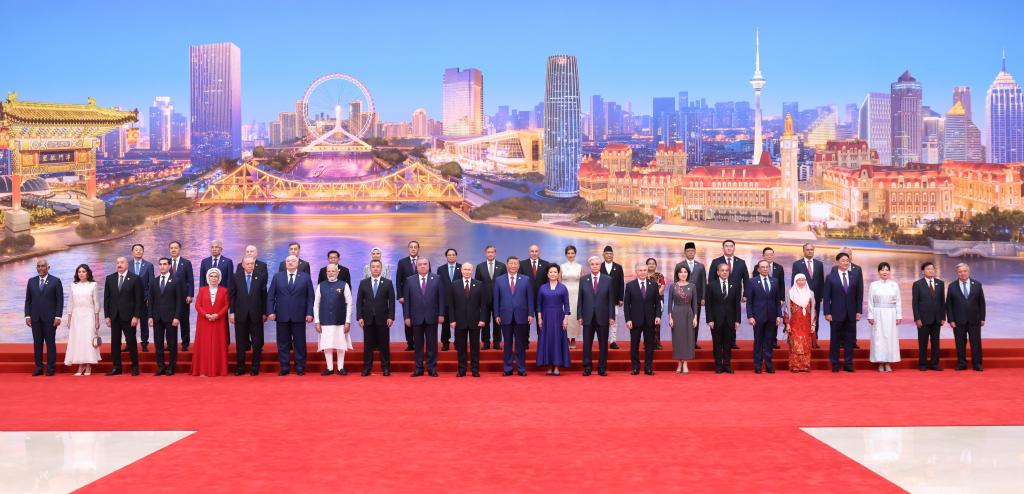
Nepal and SCO Summit of Tianjin
The Shanghai Cooperation Organization (SCO) held its 25th meeting in Tianjin, China, bringing together leaders from ten member nations, including Russia, India, and China. This summit, which some see as a counterbalance to Western influence, aimed to address trade and regional conflicts.
Since its founding in 2001, the SCO has expanded to include new members like India, Pakistan, Iran, and Belarus. While its goals remain somewhat vague, the organization has served as a platform for regional military cooperation, dominated primarily by China’s economic power and Russia’s political influence.
India's recent membership introduces a new dynamic, potentially challenging the dominance of Russia and China. Despite economic ties, India is unlikely to fully align with Russia's actions in Ukraine or China's territorial claims. India also faces its own challenges within the organization, including a dispute over a joint statement and tepid support from China and Russia for its UN Security Council aspirations.
For China, the summit was an opportunity to promote its vision of a multipolar world and showcase the SCO's economic benefits, guided by the "Shanghai Spirit." While some experts question the group's effectiveness in solving major challenges, the gathering helps to project China's leadership and influence on the global stage.
On that crucial occasion, Nepali Prime Minister K.P. Sharma Oli managed to meet the Chinese President Xi Jinping. It serves as a clear testament to the flourishing diplomatic relationship between their two nations.
This high-level bilateral dialogue, held in a significant international forum, underscores the importance both leaders place on strengthening their strategic partnership and advancing shared interests. The discussions went beyond mere pleasantries, providing a concrete framework for future cooperation and highlighting the multifaceted nature of their ties.
The meeting powerfully showcased the principle of mutual support that underpins the relationship. Prime Minister Oli's expression of gratitude for China's consistent support in Nepal's development endeavors, alongside his well wishes for the SCO Summit, was met with a reciprocal commitment from President Xi. President Xi's affirmation of China's willingness to support Nepal's national aspiration of a "Prosperous Nepal, Happy Nepali" and his thanks for Nepal's adherence to the "One China Principle" demonstrates a symbiotic relationship of trust and respect. This exchange of mutual assurances is vital for diplomatic relations to thrive.
Furthermore, the dialogue signaled a renewed focus on economic and developmental collaboration. Prime Minister Oli's explicit request for accelerated implementation of projects under the Belt and Road Initiative (BRI), along with his specific requests for support in critical areas like fertilizer, petroleum exploration, and human resources, shows a practical and forward-looking approach. President Xi's reiteration of support for "high-quality" BRI projects confirms China's readiness to invest in Nepal's growth. This practical cooperation is the engine that drives the relationship forward.
The meeting also underscored a deepening of multilateral engagement. Prime Minister Oli's request for China's support for Nepal's aspiration to full SCO membership and President Xi's assurance of cooperation in multilateral forums like the UN and the SCO, reflects an evolving partnership. This signifies that the two nations are not only focusing on their bilateral ties but are also coordinating to have a more unified voice and influence on the global stage. This strategic alignment in international bodies is a key indicator of a maturing relationship.
Crucially, the diplomatic exchanges demonstrated a level of openness and trust that is a hallmark of a robust partnership. By respectfully addressing the issue of the Lipu Lekh Pass and registering Nepal’s strong objection to the India-China understanding on border trade, Prime Minister Oli showcased Nepal's sovereignty and its confidence in the relationship. This ability to discuss sensitive issues directly, without damaging the overall bond, proves that the foundation of the relationship is solid and built on mutual understanding, even when perspectives may differ.
The warm welcome extended to Prime Minister Oli and his delegation upon their arrival in Tianjin further highlighted the cordiality and respect at the heart of Nepal-China relations. Such formal receptions at a high level are not just ceremonial; they are a public and diplomatic affirmation of friendship and hospitality, setting a positive tone for the substantive discussions that followed. This meticulous attention to diplomatic protocol is an essential component of a flourishing relationship.
Ultimately, the meeting in Tianjin was a powerful display of enduring friendship and future-oriented cooperation. By reaffirming a commitment to shared principles, expanding the scope of their collaboration from bilateral projects to multilateral forums, and handling sensitive issues with diplomatic poise, the two leaders successfully demonstrated how Nepal-China relations continue to flourish. This interaction laid a strong groundwork for continued progress and reinforced their shared vision of a peaceful and prosperous future.